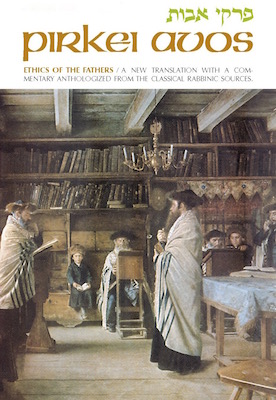 In the Hebrew book Ethics of the Fathers, a compilation of maxims and sayings from Moses’ time on down, there is the saying: ואם לא עכשיו, אימתי” translated “And if not now, then when?”
In the Hebrew book Ethics of the Fathers, a compilation of maxims and sayings from Moses’ time on down, there is the saying: ואם לא עכשיו, אימתי” translated “And if not now, then when?”
The wise have always known how fleeting is life and how necessary it is to live your life in “nonces,” in the present, in the temporary. Perhaps the most famous advice given about “fleeting life” was by Horace the Roman poet (65-8 BC) in his Odes 1:11:
“carpe diem, quam minimum credula postero.” A translation is: “Seize the day, put very little trust in tomorrow (the future)”. Another more accurate to the Latin translation is: “Pluck the day,” as one would pluck flowers.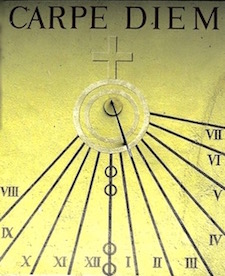
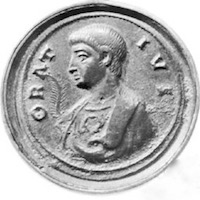
Horace was an Epicurian, a follower of the the Greek philosopher Epicurus (c. 307 BC). An Epicurean is a practitioner of sensual pleasures and of good food and drink. When Horace speaks of “plucking/seizing the day,” he is emphasizing how important it is in life to “enjoy yourself,” to “indulge in all sensual pleasures” for death looms—maybe tomorrow.
The Old Testament Job, during his innumerable trials, reminds his God: “Remember, O God, that my life is but a breath.” Job 7:7
And David, the Psalmist, cries out: “For my days vanish like smoke.” Psalm 102:3
In the New Testament James, the brother of Jesus, writes: “Come now, you who say, ‘Today or tomorrow we will go to such and such a city, spend a year there, buy and sell, and make a profit’; whereas you do not know what will happen tomorrow. For what is your life? It is even a vapor that appears for a little time and then vanishes away. Instead you ought to say, ’If the Lord wills, we shall live and do this or that.’” James 4:13-16
 Blake Brown, Pastor of Maine’s Southwest Harbor Congregational Church, in his 2017 Sabbatical Devotional expands on this verse: “Our fallen flesh causes each one of us to major in the minors. We think so much of this life and how critical it is to accumulate all this life holds out. Whether it be power, prestige or pleasure, we pursue Mammon with such fervor that (positions/stuff) can blind us to the things that really matter, the eternal things. Scripture gives us continual perspective on how fleeting this life really is by metaphors that we can relate to, whether it be water spilled on the ground (II Samuel 14:14), grass withering (Psalm 103:15-16), a sigh (ESV Psalm 90:9) or my favorite a vapor….
Blake Brown, Pastor of Maine’s Southwest Harbor Congregational Church, in his 2017 Sabbatical Devotional expands on this verse: “Our fallen flesh causes each one of us to major in the minors. We think so much of this life and how critical it is to accumulate all this life holds out. Whether it be power, prestige or pleasure, we pursue Mammon with such fervor that (positions/stuff) can blind us to the things that really matter, the eternal things. Scripture gives us continual perspective on how fleeting this life really is by metaphors that we can relate to, whether it be water spilled on the ground (II Samuel 14:14), grass withering (Psalm 103:15-16), a sigh (ESV Psalm 90:9) or my favorite a vapor….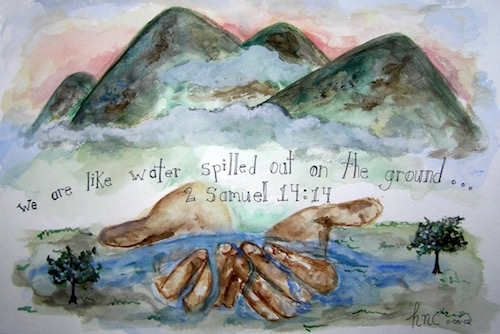
…James 4:14 encourages us to look at our life as a vapor that appears for a little while and then vanishes away. Consider this truth the next time the stock market crashes or you are tempted to preserve your reputation at the expense of a relationship or you do not want to spend ‘your’ precious time doing things for the church and expanding the Kingdom of God. Remember, even the hottest, most potent vapor disappears relatively quickly.”
It is a tried and true truism that our earthly life will and does end. The flesh withers away and is gone. But the difference between declaring or despairing at the fleeting of life and having hope at the ending of life is God.
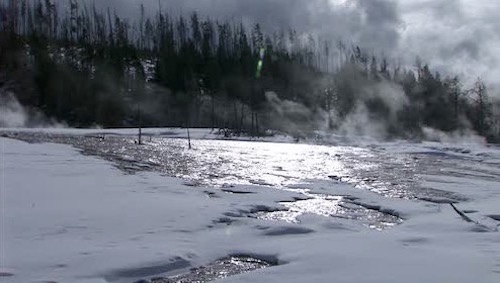
“For all people are like grass, and all their glory is like the flowers of the field; the grass withers and the flowers fall, but the word of the Lord endures forever.” I Peter 1:24, 25
“I write these things to you who believe in the name of the Son of God so that you may know that you have eternal life.” I John 5:13—Article by Sandra Sweeny Silver
